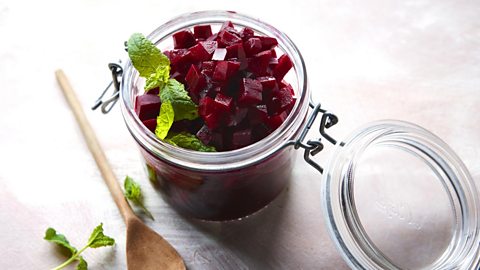Does apple cider vinegar really have health super powers?
Its rumoured benefits include lowering cholesterol, fighting COVID and even weight loss, but does the evidence stack up?

If you’re a follower of health bloggers or influencers, you’ll no doubt have come across posts singing the praises of apple cider vinegar (ACV).
A versatile ingredient, it lends an ideal whisper of acidity to the likes of salads, chutneys, pickles and grain bowls, but its virtues may go much further than flavour. It’s thought that ACV may also be able to stop an infection in its tracks, lower blood sugar levels or even lead to weight loss.
We talk to the experts to find out if there is any truth to these surprising claims.
What is ACV?
Made with fermented, pressed apples, ACV vinegar is sold filtered (this tends to be clear), or unfiltered and unpasteurised, also referred to as ‘raw’ and ‘organic’. The latter is the type that’s associated with health benefits. It’s cloudy and you might see blobs or sediment in the liquid, requiring you to give the bottle a shake before using. That murky appearance is all down to a culture which is often referred to as the mother.
“This [the mother] contains a lot of enzymes and proteins, and in addition adds to your friendly bacteria,” explains Middlesex University’s Dr Darshna Yagnik, a biomedical research lecturer who has conducted some interesting research on ACV (more on that later).
Others point to the presence of acetic acid in ACV (a compound naturally found in vinegar) as to why it might provide health benefits. Some studies link it with lowering inflammation, which could be beneficial for conditions such as arthritis. This research is limited though, and it’s worth noting much of it focuses on mice rather than humans.
How do people consume ACV for health benefits?
With Hippocrates having used vinegar to treat wounds in 420BC, its topical use for medicinal purposes goes back thousands of years and there’s evidence of people ingesting it (in teas) since the late 18th century.
Most of the modern-day ‘advice’ on using ACV for heath focusses on drinking a small amount each day, diluted with water. This comes with drawbacks though, explains dietician and BDA spokesperson, Nichola Ludlam-Raine. “ACV is strongly acidic (5–6% acetic acid), so there are risks of enamel erosion and reflux (heart burn) too.” It has also been reported that consuming too much could cause harm to your windpipe.
There are consumable products on the market made with ACV (think gummies and supplements) but it’s best to do your homework to make sure they are properly regulated.
You could of course, go for the tastiest option and just use it in your food.
Carrot and parsnip soup
This warming soup includes apple cider vinegar for extra vibrancy of flavour

Do the health claims stand up?
Infection fighting
One Saturday evening, Yagnik ate some questionable leftovers in her fridge, not remembering quite how long they’d been there. She quickly realised she’d made the wrong decision. “I didn’t feel good, I could feel symptoms starting and knew that things were not going to end well. I found a bottle of apple cider vinegar in the cupboard, so I thought, OK, let me just take a good shot of this and see what happens. So, I did. And it almost felt like the bacteria was being silenced.”
Yagnik’s symptoms stopped in their tracks.
Of course, this was just a personal experience and the scientist knew that it was by no means enough to base any conclusions on. So, curious to see if ACV really did have medicinal qualities, the following Monday morning she went to work at the lab armed with her bottle to find out if it could really work against ‘bad’ bacteria.
“I put it onto some bacteria in test tubes, and saw some death in the bacteria. You can’t always trust your first results though, so we tested a different set of bacteria. Once again, the results were quite marked.”
Together with her colleagues, Yagnik began to test whether ACV’s antimicrobial effects could fight off E. coli and MRSA. And if so, could it be as effective as antibiotics?
The results were very positive, suggesting that ACV was up to 90% as effective as antibiotics. “Not every single bacteria reacts to it though, which is the same as antibiotics – different antibiotics suit different bacteria.”
The study developed further: “I looked at some immune cells as well and whether ACV had anti-inflammatory qualities. It seemed to down-regulate some of the cytokines, which is important as these can cause inflammation.”
Nigella's rice bowl includes unfiltered apple cider vinegar
While Yagnik is keen to point out that further research is required before people start using it as a treatment to fight infection, she is confident it could, with time and further research, be used in the same way antibiotics are to treat bacterial infections.
There are disclaimers though. For example, with the health benefits linked to the unpasteurised version, Yagnik highlights this could be problematic for people who need to avoid unpasteurised products – for example people who have immunity health issues – including those who are pregnant. Also, until further research is conducted, Yagnik explains that people who are on existing medication should speak to an expert before taking ACV, as it could potentially contradict or offset other medical treatments.
Lowering cholesterol and type 2 diabetes treatment
Coventry University’s Dr Cain Clark has carried out research examining the effects of ACV on several health issues which are linked to having elevated lipid profiles and glycaemic parameters. (These, he explains, are “blood markers that can provide information about a person’s risk of developing heart disease, stroke and other chronic diseases.”) Clark and colleagues examined nine existing studies to see if a consensus on ACV’s effects could be found.
The conclusion they reached was that regular consumption of ACV could lead to better health outcomes. “We found that ‘normal’ healthy adults can improve their lipid profile, while when we looked further into the data and participants, we found that people with type 2 diabetes (not insulin dependent) had specific and significant improvements in total cholesterol and triacylglycerol.” (Total cholesterol is the cholesterol in your blood, made up of ‘good’ and ‘bad’ cholesterols, while triacylglycerol is a type of fat that is stored in your body, of which higher levels are worse for health.)
To put it simply, the evidence showed that ACV lowered cholesterol and improved the health of those with type 2 diabetes.
“We can be fairly confident some health benefit in people with type 2 diabetes may be achieved. Nevertheless, further independent work – in the form of randomised controlled trials, specifically in this population – is needed to make stronger claims.”
Vegan chocolate cupcakes
While cupcakes aren't perhaps a dish you'd associate with 'good health', they certainly taste great and it's not unusual for recipes to include apple cider vinegar

Weight loss
There are small studies which highlight that ACV could help weight loss (as part of a controlled diet), but also research which shows it doesn’t have any impact at all.
Ludlam-Raine isn’t convinced by the evidence so far. “You can get most of the potential benefits on weight loss and improving blood glucose levels from other types of vinegar too. However, evidence is minimal at present regarding appetite suppression and improving blood sugar levels following a high carb meal.”
Back in 2016, BBC Two series Trust Me I’m A Doctor carried out its own study (in conjunction with Aston University) which investigated whether ACV could help with weight loss. They divided 27 participants into three groups. Group one drank two tablespoons (30 ml) of organic apple cider vinegar diluted in 200ml of water twice a day before main meals for eight weeks. Group two did the same but with malt vinegar, while group three did the same but just with coloured water. Those on the ACV plan did lower their cholesterol levels whereas the other groups didn’t. However, no group had lost weight by the end of the eight-week experiment.
Pickled beetroot
When making pickled veg, you could use apple cider vinegar. This pickled beetroot recipe does just that

All experts we spoke to were keen to say that there’s still plenty of research to be conducted before we can definitively state that ACV helps different medical conditions. In the meantime, Ludlam-Raine says “you’re better off eating an apple – it comes with more fibre to keep your gut bacteria happy and antioxidants too. Plus, it counts as one of your five a day. However, if you want to include AVC in your diet, use it in a salad dressing alongside olive oil and black pepper rather than drinking it!”
Disclaimer: If you’re looking to improve a health condition, always speak to a medical professional before adapting your diet.
Originally published September 2023